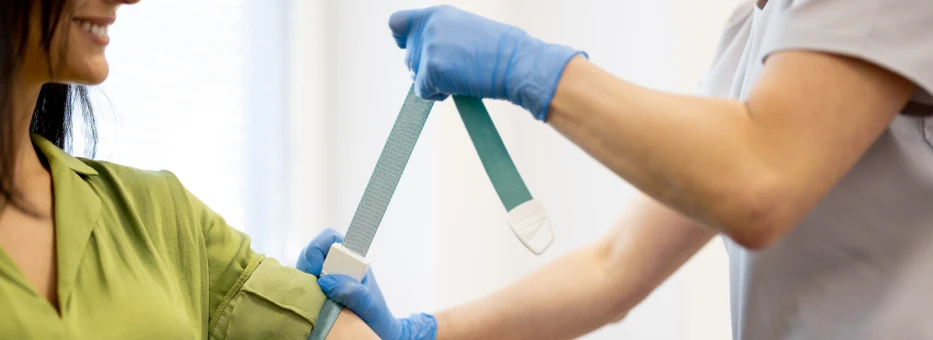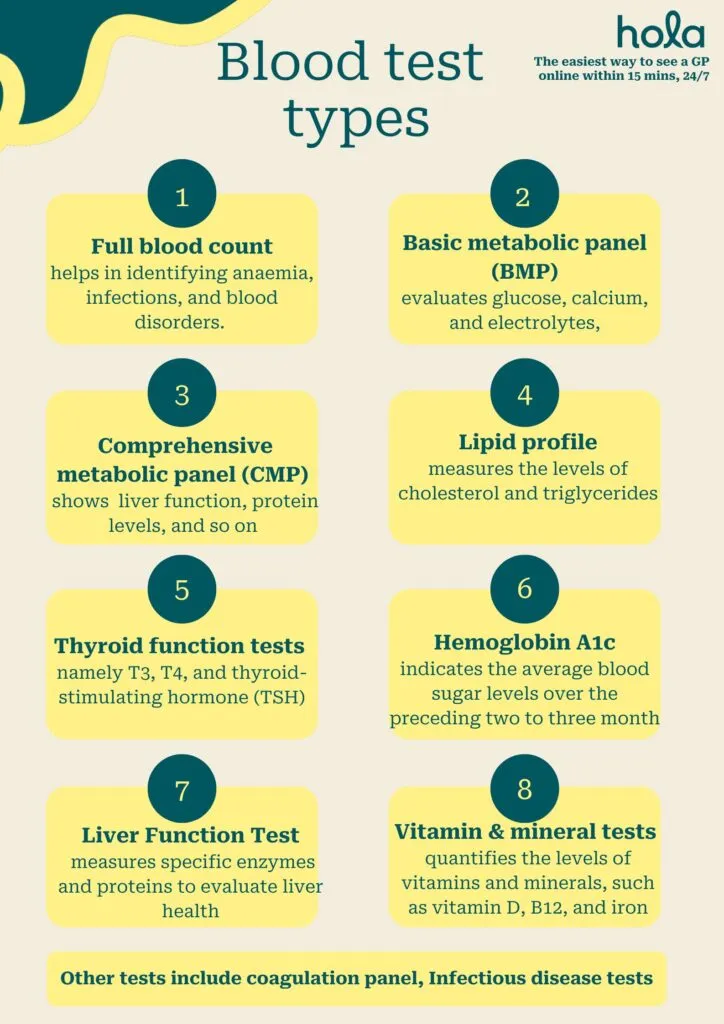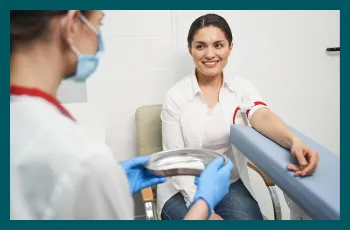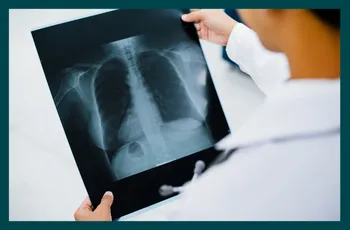Routine blood tests in Australia: GP approved
Written by editorial staff writer at Hola. Medically reviewed by Dr Mark Mellor, FRACGP DCH MBChB BSc. Dr. Ammar AL-ANI, MBChB, CCBST, AMC. Blog updated on 31 October, 2025. Originally published on 25 February, 2025.

Contents

Overview
From cholesterol screenings to diabetes assessments, blood tests are one of the most straightforward methods for monitoring your health. Australians are experiencing a notable increase in testing, with 438 pathology tests conducted for every 100 individuals1 in 2022–23, up from 366 tests per 100 a decade earlier. Here’s why GPs advocate for regular blood tests and what you should know.Routine blood tests in Australia
Routine blood tests are standard evaluations your GP may recommend to assess your body’s health. They are quick, easy, and often bulk-billed.- Full blood count (FBC): Evaluates red and white blood cells.
- Blood glucose test: Detects diabetes.
- Kidney and liver function tests: Assess the health and performance of your kidneys and liver.
- HbA1c test: Tracks long-term blood sugar levels.
- PSA test: Evaluates prostate health.
- hCG test: Used primarily in pregnancy and certain health issues.
Importance of blood test
Blood tests provide doctors with a comprehensive understanding of what’s occurring within your body.- Early detection: Identify diabetes, elevated cholesterol, and anaemia before symptoms appear.
- Chronic condition management: Monitor diabetes, heart disease, and other ongoing health issues.
- Overall health assessment: Identify nutrient deficiencies and assess the functionality of your liver, kidneys, and other organs.
Types of blood tests
 Grouped into categories, here are some of the most common:
Grouped into categories, here are some of the most common:
-
General health
- Full blood count (FBC): Includes red/white blood cells and platelets.
- Lipid profile: Measures cholesterol and triglycerides.
- HbA1c: Represents average blood sugar over three months.
-
Metabolic
- Basic metabolic panel (BMP): Evaluates kidney function, glucose, and electrolytes.
- Comprehensive metabolic panel (CMP): Also assesses liver function.
-
Hormones
- Thyroid function (TSH, T3, T4).
- PSA (prostate health).
- hCG (pregnancy and other conditions).
-
Deficiencies
- Iron studies.
-
Infections
- HIV, hepatitis, and additional viral/bacterial tests.
Specialist blood tests
Your GP may suggest additional tests beyond the basics if you exhibit symptoms, have risk factors, or a family history.- Genetic testing: Looks for inherited diseases or cancer predispositions.
- CRP (C-reactive protein): Identifies inflammation.
- Troponin: Evaluates potential heart damage, often following chest pain.
- D-dimer: Screens for the presence of blood clots.
- BNP: Assists in diagnosing heart failure.
Discuss pathology needs with a GP. Request referral for blood test with Hola.
Request now
Available 24/7, across Australia.
How to get a blood test in Australia?
If it’s your first time getting a test, here’s what to anticipate:- Visit your GP: They will determine which tests you require.
- Referral: You will receive a request form for a pathology laboratory.
- Blood collection: A nurse or phlebotomist will draw a small sample from your arm.
- Results: Sent to your GP, typically within a few days.
What to expect at a pathology lab
If it’s your first time undergoing a blood test, the experience can be a bit daunting. Here’s a general overview of what to expect:- Check in at the reception: Upon arrival, present your GP’s referral form. Some labs also accept digital referrals, allowing you to display them on your smartphone.
- Waiting for your turn: Many labs welcome walk-ins, though busier locations may have brief wait times. Scheduling a telehealth appointment can allow you to avoid long wait times.
- Blood collection by a phlebotomist: A trained expert will sanitise your arm, insert a small needle, and draw a few vials of blood. This process typically takes just a couple of minutes and may cause mild discomfort.
- Other samples, if necessary: Occasionally, your GP may request urine or swab tests alongside your blood draw. The staff will assist you through these procedures.
- Post-care: You’ll be instructed to apply pressure with a cotton pad or bandage to minimise bruising. You can resume your normal activities afterwards.
- Results: Your samples will be dispatched to a lab for analysis. Normally, results are returned to your GP within 1–5 business days, depending on the type of test.
How long do routine blood test results take?
| Test type | Turnaround time | Notes |
| Routine (FBC, BMP) | 1–2 days | Most common checks |
| Hormone or genetic tests | 3–7 days | May take longer |
| Urgent (heart attack, infections) | Hours | Results fast-tracked in emergencies |
Side effects
Blood tests are generally very safe, but there can be a few minor complications:- Slight bruising or discomfort at the site of the needle.
- Occasionally feeling faint or dizzy (rare).
- A minimal chance of infection (extremely rare).
- Blood accumulating under the skin (hematoma).
See a GP online for referrals and results
Need a referral for blood tests, but can't visit a clinic? With Hola Health, you can:- Consult an Australian GP online within minutes.
- Obtain referrals for blood tests, imaging, or specialist visits.
- Receive immediate prescriptions via SMS.
- Request same-day medical certificates.
How Hola Health can help
Hola Health eliminates the complications of blood testing:- Swift telehealth consultations – connect with a GP in minutes.
- Instant prescriptions – medications sent directly to your mobile.
- Quick referrals – for pathology, imaging, or specialists.
- Immediate medical certificates – for work or university.
Conclusion
Routine blood assessments are one of the simplest ways to safeguard your health. They identify issues early, assist in managing chronic conditions, and provide reassurance. If it’s time for a check-up, schedule a Hola Health telehealth consultation today and receive GP-approved referrals from the comfort of your home.Discuss pathology needs with a GP. Request referral for blood test with Hola.
Request now
Available 24/7, across Australia.
Reference
Australian Institute of Health and Welfare - reference linkProviding consult for
- Cough
- Nausea & vomiting
- Fever
- Hayfever
- Fatigue
- Sore throat
- Acne
- Gout
- Eczema
- Rosacea
- Sunburn
- UTI
- Erectile dysfunction
- Contraception
- Morning sickness
- Morning after pill
- Prostate health
- Anxiety
- Depression
- Stress
- Grief & loss
- Premature ejaculation
- Asthma
- Blood pressure
- Diabetes
- Cholesterol
- Migraines & headaches
- Allergies
- Heartburn & reflux
- Sleep disorder
- Gastro
Related Articles
Disclaimer
This blog is for general informational purposes only and does not indicate that Hola Health provides all treatments or preventive measures mentioned. It is not intended to be a substitute for professional medical advice. Always seek the guidance of your doctor or other qualified health professional with any questions you may have regarding your health or a medical condition. For emergencies please immediately contact 000. Any medical topics discussed are intended to educate, not to imply availability through Hola Health.




